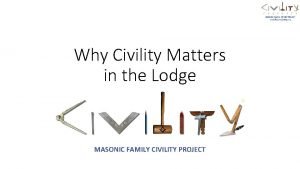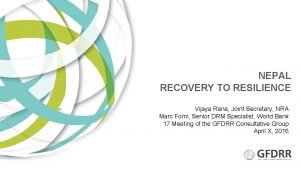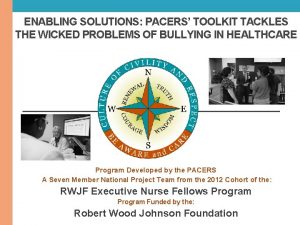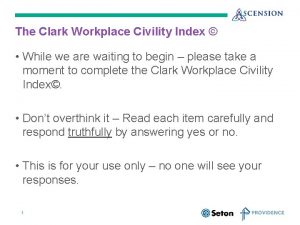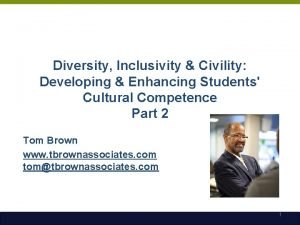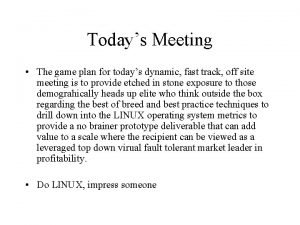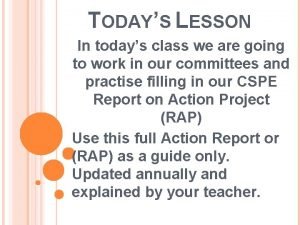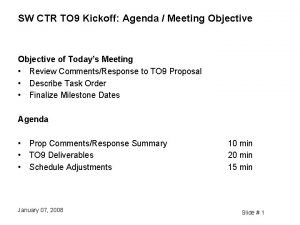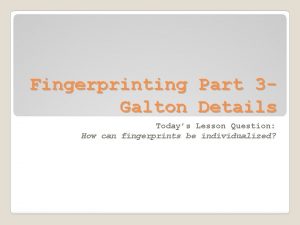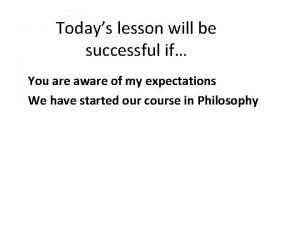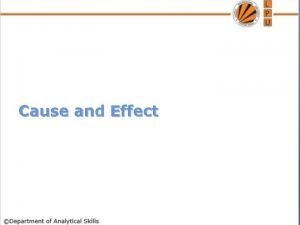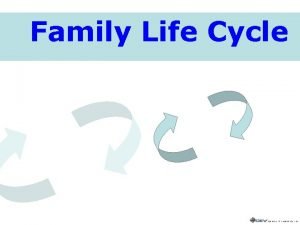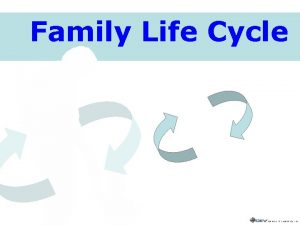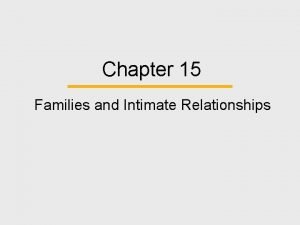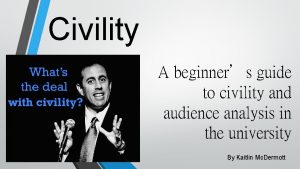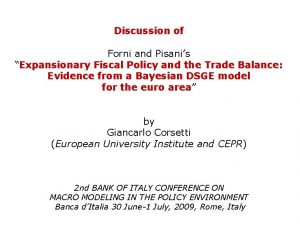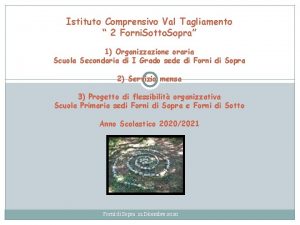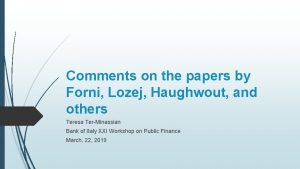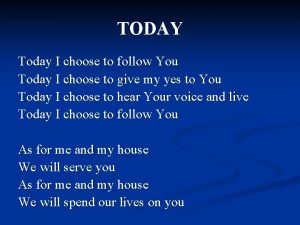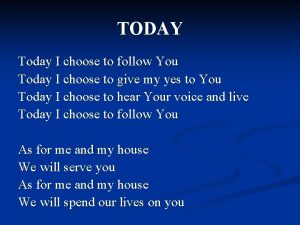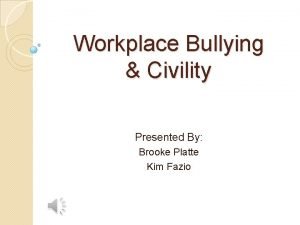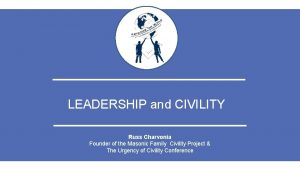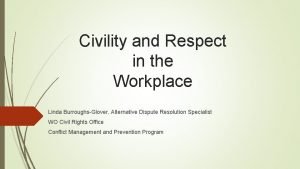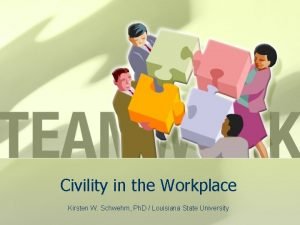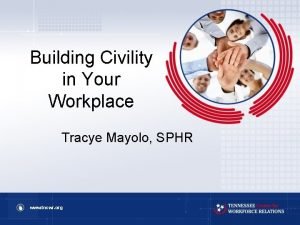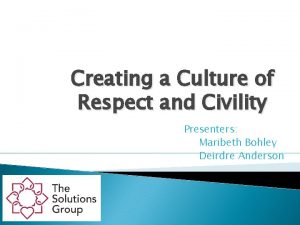Why Civility Why Today P M Forni Life



















- Slides: 19

Why Civility, Why Today? P. M. Forni

Life is a Relational Experience The quality of our lives depends on the quality of our relationships. Whether we like it or not, we are wax upon which others leave their mark.

Social Skills Strengthen Social Bonds v v v Our happiness depends on the health and strength of our social bonds. Social skills are a main determinant of our destiny. Civility, far from being trivial or marginal to our lives is an extraordinarily effective tool for the building of a better, more meaningful, and healthier life.

Civility’s defining characteristic is its ties to city and society. The Latin civitas means city, especially in the sense of civic community.

Defining Civility is a form of benevolent awareness. v Respect v Restraint v Consideration

The Three Arguments for Civility v Principle of Respect for Persons v Connection between Incivility and Violence v Civility as a Quality of Life issue

The Costs of Workplace Incivility: The Perception of a Decline Public Agenda Study, April 2002 Pew Charitable Trust Funding v v 79% lack of courtesy and respect a serious national problem 61% worsening trend in recent years

The Costs of Workplace Incivility: The Perception of a Decline v v v Baltimore Workplace Civility Study 2003 83% very important to work in a civil environment 25% workplace less civil in the last 12 months 37% decreased effort at work 13% used health care / employee assistance benefits 70% contemplated changing jobs

The Costs of Workplace Incivility: The Perception of a Decline Eticon 2002 Survey -- Measuring the Impact of Rudeness and Respect in Business Percentage of time spent dealing with rudeness: v Customers: Average 10. 05% v Coworkers or other employees: Average 14. 32%

Examples of Workplace Incivility “Forgetting” to share credit for collaborative work v Asking for input and then discounting/ignoring it v Keeping others awaiting access to information without recourse v Over-ruling decisions without open, direct rationale Quoted from Envisonworks, Inc. v “Flaming” someone on e-mail v

Examples of Workplace Incivility v v v Interrupting others without care Not listening Disrupting meetings, inappropriate behavior at meetings Rumoring, gossiping about or damaging a co -worker’s reputation Perching impatiently over someone’s desk, waiting for undivided attention Quoted from Envisonworks, Inc.

Dealing with Difficult Co. Workers v v v People are difficult because they either have too high or too low an opinion of themselves. Suggest you need the person’s help to solve the problem. Try to build the confidence of the difficult person. Choose your battles. Talk to a supervisor or Human Resources if the problem persists.

Effects of Workplace Incivility Lowered morale of the employees v Reduced workplace citizenship behaviors (littering, carelessness with handling equipment and facilities, not taking care of others, etc. ) v Reduced team effectiveness v Being uncivil to customers, clients, or others outside the immediate organization, office or facility http: //www. citehr. com/ v

The Hard Science of Soft Skills Catecholamines and the hormone cortisol are the main factors in stress response. v. Neurochemicals increase blood pressure. v. Repeated stress response can lead to serious cardiovascular disease and other ailments. v

The Hard Science of Soft Skills A hostile encounter is bad for us because it activates our bodies’ neuroendocrine responses to stress – it stirs up a hormonal storm that leaves our bodies weary and vulnerable.

The Hard Science of Soft Skills A civil and congenial encounter is good for us because it has the effect of keeping at bay the storm of stress response. Positive social interaction produces relaxation and relaxation produces good health.

Hard Science of Soft Skills A civil and congenial encounter lowers the levels of stress and releases “good” hormones, invigorating selfesteem and strengthening social bonds. It allows for thinking in more clear , sophisticated and creative ways.

Choosing Civility "All my life I have placed great store in civility and good manners, practices I find scarce among the often hard-edged, badly socialized scientists with whom I associate. Tone of voice means a great deal to me in the course of debate. I remember to say 'With all due respect' or its equivalent at the start of a rebuttal, and mean it. I despise the arrogance and doting self-regard so frequently found among the very bright" (E. O. Wilson).

Choosing Civility I believe in aristocracy… if that is the right word, and if a democrat may use it. Not an aristocracy of power, based upon rank and influence, but an aristocracy of the sensitive, the considerate and the plucky. Its members are to be found in all nations and classes, and all through the ages, and there is a secret understanding between them when they meet. They represent the true human tradition, the one permanent victory of our queer race over cruelty and chaos. Thousands of them perish in obscurity, a few are great names. They are sensitive for others as well as for themselves, they are considerate without being fussy, their pluck is not swankiness but the power to endure,
 Why civility matters
Why civility matters Horno zucchelli forni manual
Horno zucchelli forni manual Vijaya rana
Vijaya rana Vestiti etruschi
Vestiti etruschi Pacers civility toolkit
Pacers civility toolkit Workplace civility index
Workplace civility index Understanding civility and cultural competence
Understanding civility and cultural competence Ethics of civility in education
Ethics of civility in education For todays meeting
For todays meeting Are you going to class today
Are you going to class today Proposal kickoff meeting agenda
Proposal kickoff meeting agenda Today lesson or today's lesson
Today lesson or today's lesson Today's lesson or today lesson
Today's lesson or today lesson Example of repitition
Example of repitition Pictures
Pictures The life today is too fast demanding
The life today is too fast demanding Family life today
Family life today Family life today
Family life today Family life today
Family life today Paragraph about life in the past and today 3am
Paragraph about life in the past and today 3am
